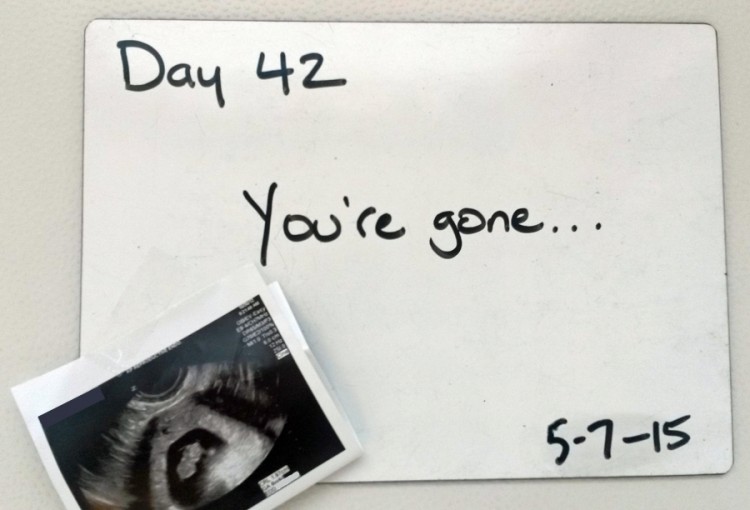One in four pregnancies will experience a miscarriage. Most commonly, miscarriage occurs in the first 13 weeks; however, miscarriage can occur up to 20 weeks. After 20 weeks, a pregnancy loss is called a stillbirth, which occurs in one in 160 pregnancies.
I had one living child when I experienced my first miscarriage in 2010. I had no idea how painful miscarriage could be, both physically and emotionally. My doctor treated my experience as a medical event and nothing more. I was devastated and desperately searched for as much information as I could not only about the process but the emotional effects I was experiencing. I felt isolated and ashamed, something I learned many women feel.
I became a bereavement doula (a person trained to assist families through pregnancy loss in any gestation) and learned about the wide range of options and support available to families enduring pregnancy loss. As a family companion and mentor through loss, women shared similar stories; their miscarriages were treated like medical events only, and they did not feel validated in their experiences. When I experienced another miscarriage in 2015, I was much more prepared and knew how to advocate for what I needed. Because of my personal experiences and the stories women shared with me, I compiled this list of 18 points I believe should be consider during miscarriage.
1. I need to decide my plan for my miscarriage. It is OK no matter what I choose, because I have researched my options and trust my intuition. I know what is right for my body, for me mentally and for my family.
2. Researching my options is important. I can read about miscarriage options or download the Miscarriage App. I realize I don’t know everything there is to know about miscarriage, and my care provider may not be aware of all the options available to me.
3. I should discuss this plan with my partner and family (if age-appropriate). I know checking in with them is important so they can share what may be important to them during this difficult time.
4. I should seek spiritual/religious guidance if desired, just to be sure I have taken care of any spiritual/religious needs or requirements of which I am not aware.
5. I will need a plan for my baby’s body. No matter how early this pregnancy was, I still need to decide what I want to do.
6. I know I must begin the experience of miscarriage. If I have chosen medical or surgical management for my miscarriage, I know when things will likely start and end, but if I have chosen for things to start on their own, I need to be patient with myself as my body prepares in its own way for this experience.
7. It’s OK if I feel relief. This is normal and many women feel this way. This doesn’t mean I didn’t love my baby or pregnancy, it’s just a relief that this part is finally over and I can begin to move forward again.
8. I should plan for my physical and emotional recovery. I will need pads, tissues and time off. I should write down a list of tasks that feel hard for me to complete like meals, doing dishes, walking the dog and time alone to grieve. I know these are important to me, but they feel overwhelming and I need someone to take these tasks on for a while.
9. It’s OK to need help from others; many women do, and it doesn’t matter how early or late in the pregnancy the loss was. Support is crucial.
10. I will allow myself to accept help from others.
11. I may need to explore outlets for my grief such as writing in a journal, listening to or creating music, crafting, volunteering for a pregnancy loss organization, pumping and donating my baby’s breastmilk or other healthy outlets.
12. I will have moments and days when I don’t feel sad. It’s OK that I don’t feel sad all the time. This doesn’t mean my loss doesn’t matter. This also doesn’t mean that when I am really sad after a period of being OK, I am depressed and need to be saved. I am just having a hard day or moment. Grief has no timeline and doesn’t look the same for each person.
13. Even though my husband, partner or children seem to be “normal” or look like this loss doesn’t matter, that doesn’t mean they don’t care and aren’t sad. They have a different way of navigating through their grief. Their way doesn’t have to be my way.
14. When I feel upset about the way my husband or partner is responding to our loss, I will communicate with them. I will share how I feel as best I can, so we can talk openly about our loss.
15. People will make hurtful comments believing they are helpful. I do not have to be “fake” and smile at these comment; I can choose to say something if I feel the need.
16. I may lose some friends. It can be really hard or easy to walk away from them, but I need to do what’s best for me and that’s OK. I do not have to hang on to friends who are toxic to me.
17. I will gain new friends. Some of these friends will become friends for life. Others will be here for moments, and that’s OK. These new friends do not have to be friends for life.
18. I will survive this. Life may look different, and that’s OK. I am different. It’s OK to let others know I am different.

Editor’s note: This is based on one person’s experiences and should not be taken as medical advice. Consult a doctor or medical professional for any questions or concerns you have.

